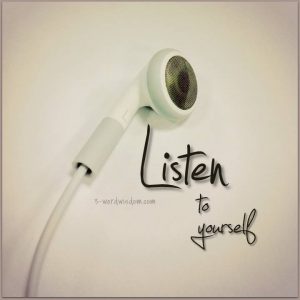Psychologists often say that it’s important to learn and listen to yourself. This idea is often rejected as soon as it seems selfish and wrong. There are two main reasons for it:
1) Attentiveness to yourself, trusting your feelings, is immediately identified with thinking only about yourself: putting yourself and your desires above others, not thinking about the feelings and experiences of others, doing everything only for yourself.
2) If a person begins to listen to their desires instead of socially accepted “necessities”, they are choosing to do only selfish, useless, dangerous, antisocial, and terrible things.
Let’s see what trusting your feelings is, and why it is directly opposite to the two misconceptions above.
Firstly, listening to yourself is listening to your feelings, which are often ignored by us due to the development of rational thinking. However, our feelings and emotions are indicators, red flags that should not be ignored. Our emotions, even our body reactions, tell us something about our state or the state of the environment. How else can an animal remember that the smell of food is useful, and falling down is dangerous? Due to the developed emotional responses that a human can experience both physically and mentally, survival, learning, the formation of groups and social systems became possible. If you ignore these signals, neglect and don’t trust them, you can find yourself in an extremely difficult situation.
Secondly, trusting feelings and emotions, hearing your desires does not mean obeying them. This is all about awareness and decision-making ability. For example, a person feels anger. Instead of immediately beginning to rationally challenge it with the thought “there is no point in being angry”, this person can just notice and accept this emotion. The next step is to understand what made them feel that way. This means that they will not submit to emotion, but will be able to make a decision about their actions based on it. Otherwise, a person who doesn’t understand their feelings and doesn’t hear himself acts on automatisms, which are mostly far from being useful.
Thirdly, if a person doesn’t know their needs or wishes, they are easily manipulated. It is enough to put up a sign with good advertising – and buyers begin to feel the desire to buy a product. This is not a desire of their own, it was imposed by somebody. However, many people don’t even ask themselves if they really want something. Many of us don’t even know how to find out what they want! As a result, fraud and manipulations are the prices of being unable to trust yourself (trust your gut).
And finally, one of the basic human needs is to be in a group, society. It has developed evolutionarily as well: in a group, the chances of surviving and raising offspring are much higher. Therefore, we have not only psychological but also biological mechanisms that encourage close relationships with other people. Since this need is strong enough, a person who begins to listen to himself very quickly notices this strong desire to be loved, accepted in the group. People don’t want to be separated from others, they want to understand and be understood, to care for and be cared for, to be on good and intimate terms with others. If people understand what brings them joy, pain, anger, and so on, they can build more open, trusting, and happy relationships. They don’t play games, they avoid manipulation, and strive for a true understanding of the other person.

Therefore, trusting yourself is…
- Paying attention to significant signals in time (thanks to emotions);
- Acting in the best possible way based on the situation and their feelings (and not on maladaptive automatisms);
- Understanding what is one’s own feelings and what is imposed by others, the ability to avoid manipulation and deception;
- Being able to build strong and long-term relationships with other people.
Source: Therapy Route

